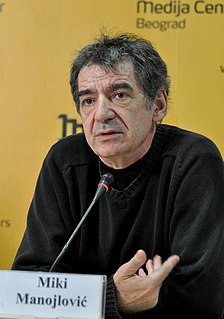
William Jefferson Clinton is an American politician and attorney who served as the 42nd president of the United States from 1993 to 2001. Prior to his presidency, he served as governor of Arkansas and as attorney general of Arkansas (1977–1979). A member of the Democratic Party, Clinton was known as a New Democrat, and many of his policies reflected a centrist "Third Way" political philosophy. He is the husband of former secretary of state, former U.S. senator, and two-time candidate for president Hillary Clinton.
In computer science, pseudocode is a plain language description of the steps in an algorithm or another system. Pseudocode often uses structural conventions of a normal programming language, but is intended for human reading rather than machine reading. It typically omits details that are essential for machine understanding of the algorithm, such as variable declarations and language-specific code. The programming language is augmented with natural language description details, where convenient, or with compact mathematical notation. The purpose of using pseudocode is that it is easier for people to understand than conventional programming language code, and that it is an efficient and environment-independent description of the key principles of an algorithm. It is commonly used in textbooks and scientific publications to document algorithms and in planning of software and other algorithms.

The Star Wars science fiction universe, created by George Lucas, features dialogue that is not spoken in natural languages. The lingua franca of the franchise, for which the language the words are dubbed or written stand in, is Galactic Basic. Characters often speak languages other than Basic, notably Shyriiwook spoken by Chewbacca, droidspeak spoken by R2-D2 and BB-8, and Huttese spoken by Jabba the Hutt.

The United States Information Agency (USIA), which existed from 1953 to 1999, was a United States agency devoted to "public diplomacy". In 1999, USIA's broadcasting functions were moved to the newly created Broadcasting Board of Governors, and its exchange and non-broadcasting information functions were given to the newly created Under Secretary of State for Public Diplomacy and Public Affairs at the U.S. Department of State. The agency was previously known overseas as the United States Information Service (USIS).
The Greek alphabet has been used to write the Greek language since the late ninth or early eighth century BC. It is derived from the earlier Phoenician alphabet, and was the first alphabetic script in history to have distinct letters for vowels as well as consonants. In Archaic and early Classical times, the Greek alphabet existed in many local variants, but, by the end of the fourth century BC, the Euclidean alphabet, with twenty-four letters, ordered from alpha to omega, had become standard and it is this version that is still used to write Greek today. These twenty-four letters are: Α α, Β β, Γ γ, Δ δ, Ε ε, Ζ ζ, Η η, Θ θ, Ι ι, Κ κ, Λ λ, Μ μ, Ν ν, Ξ ξ, Ο ο, Π π, Ρ ρ, Σ σ/ς, Τ τ, Υ υ, Φ φ, Χ χ, Ψ ψ, and Ω ω.

Prajñā (Sanskrit) or paññā (Pāli), is a Buddhist term often translated as "wisdom", "intelligence", or "understanding". It is described in Buddhist commentaries as the understanding of the true nature of phenomena. In the context of Buddhist meditation, it is the ability to understand the three characteristics of all things: anicca (impermanence), dukkha, and anattā (non-self). Mahāyāna texts describe it as the understanding of śūnyatā. It is part of the Threefold Training in Buddhism, and is one of the ten pāramīs of Theravada Buddhism and one of the six Mahāyāna pāramitās.

A paternal bond is the human bond between a father and his child.
Koji Nakata is a former Japanese football player. He played for Japan national team.

A graphic designer is a professional within the graphic design and graphic arts industry who assembles together images, typography, or motion graphics to create a piece of design. A graphic designer creates the graphics primarily for published, printed, or electronic media, such as brochures (sometimes) and advertising. They are also sometimes responsible for typesetting, illustration, user interfaces, and web design. A core responsibility of the designer's job is to present information in a way that is both accessible and memorable.
Plain English is language that is considered to be clear and concise. It may often attempt to avoid the use of uncommon vocabulary and lesser-known euphemisms in order to explain the subject matter. The wording is intended to be suitable for a general audience, and allows for comprehensive understanding and/or to help establish familiarity with the topic.

Predrag "Miki" Manojlović is a Serbian actor, famous for his starring roles in some of the most important films of former Yugoslav cinema. Since the early 1990s, he successfully branched out into movies made outside the Balkans and became active in productions all over Europe.

The NPD Group, Inc. is an American market research company founded on September 28, 1966 and based in Port Washington, New York. In 2017, NPD ranked as the 8th largest market research company in the world, according to the independent AMA Gold Report Top 50 report. The NPD Group operates in 20 countries, across more than 20 industries.
Ethnoecology is the scientific study of how different groups of people living in different locations understand the ecosystems around them, and their relationships with surrounding environments.

The Eastern Conference is one of two conferences in the National Hockey League (NHL) used to divide teams. Its counterpart is the Western Conference.

The Minnesota Department of Natural Resources is the agency of the U.S. state of Minnesota charged with conserving and managing the state's natural resources. The agency maintains areas such as state parks, state forests, recreational trails, and recreation areas as well as managing minerals, wildlife, and forestry throughout the state. The agency is divided into six divisions - Ecological & Water Resources, Enforcement, Fish & Wildlife, Forestry, Lands & Minerals, and Parks & Trails.
A bakhsh is a type of administrative division of Iran. While sometimes translated as county, it should be more accurately translated as district, similar to a township in the United States or a district of England.
Dennis Overbye is a science writer specializing in physics and cosmology.
Paritta (Pali), generally translated as "protection" or "safeguard," refers to the Buddhist practice of reciting certain verses and scriptures in order to ward off misfortune or danger, as well as to the specific verses and discourses recited as paritta texts. The practice of reciting or listening to the paritta suttas began very early in the history of Buddhism.

Abun, also known as Yimbun, Anden, Manif, or Karon, is a Papuan language spoken along the northern coast of the Bird's Head Peninsula in Abun District, Tambrauw Regency. It is not closely related to any other language, and though Ross (2005) assigned it to the West Papuan family, based on similarities in pronouns, Palmer (2018), Ethnologue, and Glottolog list it as a language isolate.
Culture and social cognition is the relationship between human culture and human cognitive capabilities. Cultural cognitive evolution proposes that humans’ unique cognitive capacities are not solely due to biological inheritance, but are in fact due in large part to cultural transmission and evolution. Modern humans and great apes are separated evolutionarily by about six million years. Proponents of cultural evolution argue that this would not have been enough time for humans to develop the advanced cognitive capabilities required to create tools, language, and build societies through biological evolution. Biological evolution could not have individually produced each of these cognitive capabilities within that period of time. Instead, humans must have evolved the capacity to learn through cultural transmission. This provides a more plausible explanation that would fit within the given time frame. Instead of having to biologically account for each cognitive mechanism that distinguishes modern humans from previous relatives, one would only have to account for one significant biological adaptation for cultural learning. According to this view, the ability to learn through cultural transmission is what distinguishes humans from other primates. Cultural learning allows humans to build on existing knowledge and make collective advancements, also known as the “ratchet effect”. The ratchet effect simply refers to the way in which humans continuously add on to existing knowledge through modifications and improvements. This unique ability distinguishes humans from related primates, who do not seem to build collaborative knowledge over time. Instead, primates seem to build individual knowledge, in which the expertise of one animal is not built on by others, and does not progress across time.











